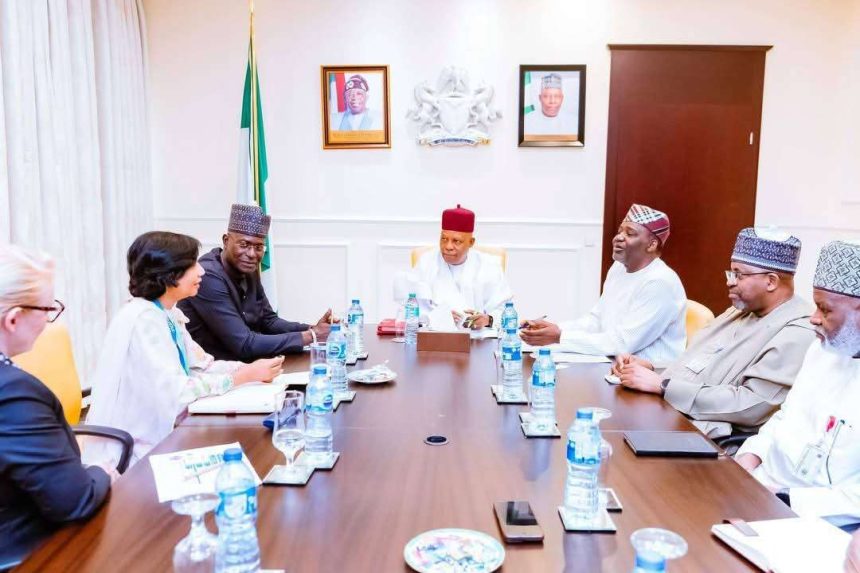GenU 9JA —In a bid to boost advanced digital literacy amongst Nigerian youth, the Federal Government of Nigeria has revealed plans to train 20 million young Nigerians in digital skills by 2030.
This was revealed after the Vice President, Kashim Shettima, accepted an offer to chair the board of Generation Unlimited Nigeria (GenU 9JA), an initiative under the United Nations Children’s Fund.
What you should know
The initiative seeks to transition young Nigerians between the ages of 10-24 from learning to earning through digital connectivity.
About GenU 9JA
- GenU 9JA is a platform looking to empower young, spirited Nigerians to lead community-based projects.
- The platform seeks to engage with key stakeholders to voice the opinion of mostly vulnerable youths and to advocate for beneficial youth-focused initiatives within their communities.
- As a Public-Private-Youth Partnership platform, GenU 9JA supports Nigerian youths in successfully transitioning from learning to earning.
- The platform is expected to empower 20 million youth by 2030 through digital learning, job-related 21st-century skills, and livelihood opportunities.
How GenU 9JA started
GenU 9JA was launched in 2021, and has empowered nearly 9 million young Nigerians as of November 2024, surpassing its 7.5 million three-year target.
The initiative is driven by three core pillars: connectivity and digital learning, workplace readiness and youth engagement.
Reaction from Vice President
Speaking on the development, Vice President Kashim Shettima noted that the initiative aligns with the Federal Government’s Renewed Hope Agenda, which focuses on inclusive development, digital innovation and youth empowerment as tools for national transformation.
He stressed that Nigeria is not seeking charitable platforms but a sustainable, equitable partnership for national transformation.
“We are not looking for charity. We want a mutually beneficial relationship based on respect and shared interests. Beyond leadership in our enlightened self-interest, if we want to live in this part of the world, we have to involve them, we have to empower them.”
How UNICEF is supporting digital literacy across Africa
- Connecting Schools to the Internet: UNICEF is working to connect 500,000 schools across Africa to the internet by 2030, aiming to reduce costs and encourage private sector investment. This initiative is expected to cost approximately $6 billion over five years, with an additional $1.2 billion in annual operating costs.
- Airtel Africa Partnership: UNICEF partnered with Airtel Africa to connect one million African children to digital education, providing access to quality digital education resources across 13 countries, including Chad, Congo, and Nigeria. The partnership has connected over 1,500 schools to the internet and trained around 17,000 teachers.
- Digital Learning Platforms: The Airtel Africa-UNICEF partnership provides free access to online educational content, enabling learners to access digital learning platforms and acquire vital digital skills.
- Teacher Training: UNICEF trains teachers on using digital tools, enhancing their skills to deliver quality education. Over 17,000 teachers have been trained under the Airtel Africa-UNICEF partnership.
- Digital Divide Reduction: UNICEF aims to bridge the digital divide by connecting schools and communities to the internet, ensuring equal access to quality digital learning for vulnerable children.
- Procurement Initiative: UNICEF’s procurement team is leveraging its expertise to deliver goods and services, including internet connectivity solutions, to address the digital divide.
- Solar Power and Satellite Connections: UNICEF is exploring alternative connectivity solutions, such as solar power and satellite connections, to address infrastructure challenges in areas with limited electricity.
- Market Transparency: By mapping school connectivity and developing finance and delivery models, UNICEF improves market transparency and reduces risk for private investors.
- Funding and Partnerships: UNICEF attracts funding from bilateral and multilateral sources, working with governments to secure financing for digital literacy initiatives.
- Digital Skills Development: By providing access to digital learning platforms and training teachers, UNICEF enables children to acquire vital digital skills, preparing them for the global economy.





